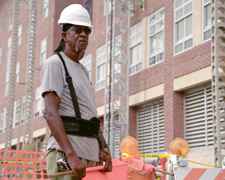Residential Life has relocated 38 residents of Carrollton Hall as a result of an estimated $10 million project to repair faults in the building’s original design.
Preliminary construction on the seventh floor of the dormitory began August 1, and workers officially received their demolition license to remove bricks from the exterior on Wednesday.
Construction on the seventh floor is expected to last 12 weeks, while the sixth floor is estimated at eight weeks. The entire renovation is expected to take approximately 14 months.
As a result of the construction, students originally slated to live on the sixth and seventh floors of Carrollton have been moved to lower floors while repairs are done on the seventh floor. Once construction is complete, a contracted moving company will assist students in moving their belongings and furniture back to the seventh floor and workers will begin construction on the sixth floor.
Director of Residential Life Robert Reed said that, at the moment, construction is on schedule. However, he said construction could take extra time once workers finish with the sixth floor and move to the fifth floor, which houses a substantially larger amount of students.
“That’s our only real worry right now,” Reed said.
The larger number of students would force Residential Life to move Carrollton residents to Biever, Buddig or Cabra Halls.
However, according to Reed, the number of students living on campus usually takes a three to four percent drop in the spring semester. Reed also said the drop in on-campus population would help keep the department from having to move anyone outside of his or her original residence.
“Our goal is to only move people once,” Reed added.
In a letter to the displaced students dated July 27, 2004, Vice President for Student Affairs James Eiseman stated: “This repair work is necessary to correct certain design and construction defects that have allowed moisture intrusion into the building and caused mold and mildew to grow inside of exterior wall cavities.”
In his letter, Eiseman cited litigation as an impetus for the construction in order to “mitigate any further damage to the building.”
Mold intrusion in Carrollton-New Residence Hall has been a concern for Loyola for some time now. Last January, Loyola filed suit against the construction, insurance and engineering companies of then New Residence Hall -MAPP Construction, Inc.; Travelers Property & Casualty Insurance Company; Eskew + A Professional Corporation; and Einhorn Yaffee Prescott, Architecture & Engineering, P.C. were named as defendants.
According to Reed, Loyola will be seeking most of the construction costs in the suit.
The timing of the construction however has been a sore spot for some, who believe work should have begun earlier in the summer.
“I realize that it has to be done,” said Carrollton resident Jeffrey Barker, a management senior, “but I think it would have been more convenient for Loyola to have done this during the summer when [they] didn’t have so many people living on campus.”
Another major concern for some students is the issue of a penalty for opting out of a residential contract, which would still charge the resident 40 percent of what they would have paid in residential fees.
Upon being briefed by Reed and Associate Director of Residential Life Michelle Andrews, Martina Mills, communications senior, and Michelle Clarke, sociology junior, went before the University President, the Rev. Kevin Wildes, S. J., to voice their concerns. Mills is the SGA president and Clarke is the vice president.
“Our biggest concern was about students having to pay the penalty for opting out,” Mills said.
According to Mills, after Wildes took their concerns into account he then decided that releasing students from their residential contracts would not be financially or physically feasible for the university and that students who had signed contracts would have to remain on campus.
According to Reed, students who sign residence contracts are not signing up for a specific dormitory, rather they are signing an agreement with the university to provide adequate housing on campus. For any residents wishing to learn more or express their thoughts on the matter, Wildes will meet with residents this Tuesday at 6 p.m. in the St. Charles Room.







